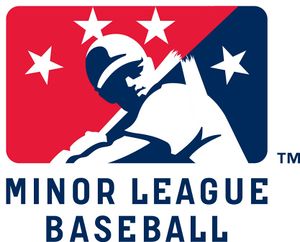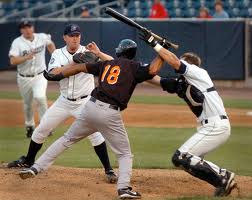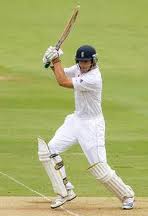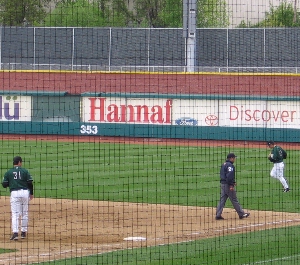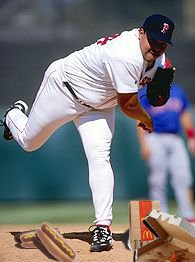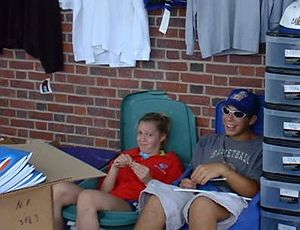Minor League Baseball
Minor League Baseball (MiLB)[1] is the association that runs baseball leagues at levels below the Major Leagues. It was given the title Minor League in 1869, in ironic contrast to the Major Leagues, as its clubs had Minor fan support and exhibited a very Minor quality of play. Their bank balances were also Minus. The third word, Baseball, was appended mere decades later, to emphasize that baseball was sometimes played amongst the copious amounts of drinking, spitting, fighting and spitting.
If baseball is America's greatest pastime, Minor League Baseball is America's principal waste of time. It is often described as a farm system for Major League clubs, generally because both the pay and the victuals resemble slop from a trough.
The economic significance of Minor League Baseball is as a place where nearly everyone demonstrates willingness to work for little or no pay, out of faith that the next job will be different.[2]
League classification
There are currently 246 teams competing in 20 different leagues, which are ranked by their poor standards of play into various classes.
The traditional letter grades that rank the minor leagues (from mediocrity down to true patheticocrity) have always been controversial. Originally there were A leagues, B leagues, and C leagues. The latter leagues were stung by the implication that they were somehow worse than A-grade. Therefore, in the 1940s — in a process imitated by Department of Agriculture food standards, and by Lake Wobegon for grading pupils — the lower grades were retired and new, higher designations emerged. The AA and AAA leagues could claim they were better than A-grade (better than the best). That is, sneaking extra A’s onto their league name greatly increased the prestige of the ball clubs.
This led to what Baseball historians call the “A wars,” where each league tried to outdo one another by adding more and more A’s. Although the term “A wars” implies confrontation between league commissioners and the front office of ball clubs, thankfully, like conflict on the ball field, everyone was on the same side and the only real adversary was the paying fan. The wars culminated in the late '40s with the creation of class AAAAAAAAA, which forced the federal government to step in and limit the use of A’s to three.
AAA
The highest ranked class is triple A, affectionately known as the Parking Lot due to the many baseball careers that never progress any further than this level. Use of this moniker has strengthened lately due to a recent trend of fans parking their cars in the outfield, knowing that most hitters lack the skill or strength to hit the ball that far. Teams are usually constructed of washed-up major-leaguers and washed-up bums that never quite made it to “The Show,” with the remaining roster spots filled with washed-up corpses from the local river or wetlands.
AA
The double A class comprises leagues that are in-between, sited in cities that are in-between. Ballplayers spend a few years here to accustom them to being in-between; that is, unsure of their status or future and unable to do anything about it.
A
Class A, or single A, typically refers to two different sub-classifications; Class A Below Average and the Canadian Class Eh leagues. Clubs that play in single A are often referred to as A*Teams. This is the franchise's official name, although fans who are disenfranchised instead use a series of grunts, moans, and obscenities. Their team rosters usually comprise unwanted draft picks or players in need of a confidence boost that can only be achieved by wailing on someone smaller than themselves.
There is also a Class A short season for fans who get easily bored of sitting around and watching men chew tobacco long before the Fall chill sweeps the nation.
Independent Leagues
In addition to the numerous leagues at the A, AA, AAA, and AAAAAAAA level, there are many independent leagues, or "indie" leagues, operating around North America without any affiliation to a Major League club.
Independent baseball players, or Indians as they prefer to be known, are often categorized by their stylish looks and rebel sentiment, often displayed through insubordinate facial expressions. Players on the same team rarely wear matching uniforms (This is considered a social faux pas), but are instead distinguished from opponents by their hair style and brand of sneakers. Players will often play for a club not for money, but they joy they get from keeping it underground; that is, until their club becomes a commercial success and they quit in a huff and give an exclusive interview to the city's newspaper on how cheap the owner is.
Independent clubs are proud to be in the enviable position of being able to sell their player contracts to any of the 30 Major League organizations, after the league deducts a small "development" fee that covers scouting, negotiators, repairing the bat rack in the dugout after Slugger's last rampage, and small, tasteful office parties at League headquarters every Friday. Fans in declining small cities in the rust belt are delighted to be able to see "future stars" in action, never asking themselves why the hometown heroes never got a look from, or washed out of, the real organizations.
Some popular teams planted in unpopular places include the Lancaster Post Punks, the Long Island New Wave Rockers and the ever dominant Bridgeport College Radio Playlists, the latter gunning for their seventh straight pennant if only the players will arrive on time for the pre-game workouts despite the splitting hangovers.
Characters
The owner
Whether a local ne'er-do-well or a recent arrival in town, the franchise owner gets everyone around him to instantly regard him as all of the following:
- A sportsman since his youth
- The area's biggest-hearted benefactor
- Someone with unique interest in young people, to whom he will be the perfect role model, and
- A prime candidate for elected office.
All he has to do is stop clipping coupons and cash in his bonds to make the initial investment, and to have some way of funding chronic six-figure annual losses. He is introduced at a press conference at the fanciest restaurant downtown, and everyone envisages an era in which money and champagne flow like rain — though it would never rain on a day with a home game.
It helps if he has one or more silent partners, who own some small fraction of the team but somehow are willing never to interfere with the gigantic ego-trip described above. Their role is like owning the caboose of the Silver Streak.
His family is pressed into service for the entire baseball season, in the same menial roles as interns (see below) except that everyone treats them like royalty as they sweep the bleachers.
Most regular fans have fond memories of the owner spontaneously choosing to sit with them for an inning — generally, after it is obvious even to the youngest in the family that the owner has spent about an hour too many in the Hospitality Suite.
Unfortunately, after between two and eight years, the thrill of owning a team fades. Another way of saying this is that everyone is onto you, especially all the suppliers who never got paid. At that point, there is a mysterious, hushed sale of the franchise, and the cycle repeats.
His accountant
The owner's accountant has a more challenging task than an aging slugger trying to focus on a fastball. He — while staying within the bounds of tax law and accounting standards, and technically not lying to anyone — must make a convincing case that the team is losing money every year. The most common way to do this is to make food concessions and merchandise sales flow to a separate corporation no one knows about. The resulting losses are a useful device to claim you should not be held to full, timely rent payments, nor least of all the agreed-on compensation to the City for building that new Luxury Suite.
Advertisers
Local businesses (that is, companies that earn actual money) are shamed into buying an advertisement on the outfield wall. While broadcasters often guarantee that the ad will not go head-to-head against one from a competitor, the ballclub is happy to sell several car dealers adjacent advertising space, and hopefully to play them against one another to buy ever-larger signs. Outfield signs include the business's phone number and website, in the rare case that any fan is motivated to use binoculars to read it and then copy it down.
For additional cash, a sponsor can have his ad read over the P.A. between innings. Advertisers understand that incessant repetition is the key to success, and that potential customers respond the best to ads above the Threshold of Pain. Again, many fans who appear merely to be keeping scorecards are in fact furiously jotting down advertisers' phone numbers to avail themselves of that once-in-a-lifetime deal.
Sponsors hope their ads will be seen by a lot of fans. Here, too, the accountant helps the team by inventing attendance figures that actual fans can see are flagrantly phony. Season-ticket holders are counted as attending every game, though most of them were shamed into it and attend none. The count also includes:
- Pensioners who got a free ticket for buying a Slurpee.
- Bums who got in by returning three baseballs hit over the fence.
- Visitors to the newspaper who took a ticket from the stack at the reception desk.
- Pretty girls that a player has "comped."
There is no evidence that any of these want a new car, state-of-the-art industrial security cameras, or even the City's Best professional pedicure.
"Athletes"
Athletes (invariably pronounced "ath-a-letes") are the marquee talent in the organization. Their talent is not only playing baseball, but scraping dried vomit off the stadium seats and spending entire off days in uniform trying to wave traffic into a car wash that is a sponsor.
Each league's roster rules guarantee that the athlete's pay is a pittance, and let the owner tell the athlete there is simply no "room" to pay more. The pay is essentially a salary, and the time period is the entire day and night (unless an athlete wants to look uncooperative and get a good night's sleep). Ballplayer pay is the clearest example of the fact that there will always be a way around a minimum wage law.
Athletes play Minor League Baseball for the same reason that you, dear reader, play Powerball: You realize that a minuscule number of players make it to the ultimate goal, but that the result is incalculably delicious. (Annie at the ballpark[1] presents comparable odds.)
Athletes in the Indie leagues take the biggest risk. They spend all summer with the club in hopes that a scout from an affiliated organization will saunter in and see something of interest, such as that the last round of Tommy John surgery seems to be holding up, so far. They dote on any fan wearing a team-logo golf shirt, writing on a clipboard, or entering the grandstand with a briefcase. The casual fan can make an athlete salivate by holding a cowbell as though it were a radar gun.
Athletes experience pleasures along the way, such as when a kid asks them for their autograph. This is a pleasure because the kid generally doesn't ask for the athlete to sign 20 copies (for ease of listing on eBay) or have Mylar in front of the card to scan into a computer or apply to a time-payment contract.
Interns
Employees of the club who are not expected to connect with, or catch, anything are referred to as interns. Like athletes, a club only accepts interns who have years and years of familiarity with professional sports, resulting in skills that will go utterly unused during their stint with the club. However, interns have the following differences from athletes:
- Scouts from affiliated organizations never come to the ballpark to scout interns, nor do they snatch them away from the club in order to pick up trash and install new bin liners at a higher level.
- Athletes are "paid," in a manner of speaking. Interns merely receive college credit. The only cost to the team is that someone from the front office must submit a report on the intern's "performance."
The main reason why interns agree to this situation of complete exploitation is that it is a requirement to graduate with that degree in Sports Management. The position does have one fringe benefit though, which is a three-letter word with an X in it; and it's not a free pair of sox. An unsupervised work experience is also unchaperoned, and the ballpark is rife with vendors and ushers chosen for their curves — and, for those who are either female or gay, thirty young hunks in the dugout, all of whom are certain to be millionaires soon (just ask them). There are wild parties after every game, fueled by racks of beer bottles, each containing the two ounces you didn't pour into the customer's plastic cup.
Media
The beat reporter for the local newspaper, and the play-by-play commentator for the 50-watt radio station, have the unique duty to make the game seem interesting. It is easy for them to turn any hitting slump or offhand insult into high drama, and twice a year, the reporter must write a gripping column about how the city risks having the franchise move away if fans don't start attending games.
The true drama, which is never reported on, concerns the annual negotiations between the ball club and the newspaper or radio station, all of which are equally desperate to have attention paid to them for any reason, but also to avoid the impression that their coverage is biased by receiving payment from the club.
Reporters need to be able to portray a 16-inning demonstration of inability to hit any pitch into a "classic pitching duel," and likewise a 22-to-3 rout in which the bullpen catcher pitched the last three innings as a "showcase of slugging."
Reporters, like interns, are not scouted for service at higher levels of baseball, but they are expected to sell their homes and move to the other coast in response to vague promises in order to show that they are "dedicated to their career."
Host families
The process of driving team costs to rock-bottom is supercharged by asking fans to "host" a player. The fan and his family get the priceless experience of living with an actual athlete, who may speak English and might (if he is from Texas) even be polite, and nice with the kids (if they enjoy shooting squirrels in the neighbor's backyard). The family learns about the life of the athlete, including fighting visa issues, learning to ignore those strange creams in the bathroom, and dealing delicately with the fact that the guest-room door was locked at 2 this morning, and so Rex tore it off its hinges. It is always fun to have an athlete at the dinner table, and often one of his lady friends who works downtown.
Differences from the Major Leagues
Minor League Baseball considers itself the authority on baseball, as Major League Baseball does too, but subtle and not-so-subtle variations to the rules, facilities, and player conduct distinguish the two:
- Minor League players aren’t allowed to chew tobacco; but cigarettes and cigars are okay, and the entire outfield often gathers around a large, bellowing hookah between at-bats.
- Major League games last 9 innings. Minor League games last until someone loses the only ball or whoever owns the bat rages at an umpire's call and storms off the field.
- Major League stadiums are monstrous colosseums situated in large cities, with tens of thousands of seats and perfectly manicured lawns. Minor League ballparks are often dilapidated tracts of weed-infested land that usually share space with local fresh produce growers to save money on rent.
- Major League players have an average annual salary of $3.3 million. If they aren’t happy with their current return, their agents can bargain for a franchise-crippling pay increase. Minor League players get a free hat with a handsome Pepsi logo on the back.
- A reverse version of the Infield Fly Rule is enforced based on the belief that most Minor League players would drop a pop fly whether or not there are baserunners.
- A disabled Major League player can be placed on a 15- or 60-day Disabled List, opening up a roster spot. In contrast, all Minor League players are considered disabled.
Footnotes
See also
- Baseball
- Rules of baseball
- Major League Baseball
- Major League Bloodbath
- American Defenders of New Hampshire
- Birmingham Niggers
